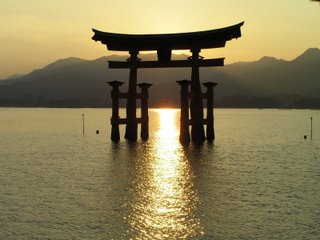
Pictured, the Giant Buddha of Kamakura, photo by Ikumi Kishiya
While I enjoy well-made anime, it seems that Japan's live-action film industry suffers by comparison. Of Japanese-made films, most of the top-grossing ones in Japaneach year are animated, and mostly aimed at children. It's all part of the kawaii culture that currently dominates Japan at the expense of anything more sophisticated and adult, and I'mnot talking about porno-adult.
While masters of the art, like Miyazaki, continue to entertain and enthrall,most of the anime is fairly disposable and built on long-standing franchises such as OnePiece, Doraemon, Pokemon, & Dragonball. Yes it is refreshing that unlike the narrowlyfocused American comic book industry, which really only supports SuperHero themedprojects, despite impressive books and films based on non-spandex themes, the Japanese manga and anime choices are varied and interestingly diverse. And it's also nice thatcartoon doesn't automatically equal juvenile and childlike. But at the same time, manyJapanese teenagers I talk to rarely read "novels" or any type of book withoutpictures/drawings, and this is also troublesome.
Japan's live-action films have failed to produce anything in recent years thathave had the international success that recent Chinese films have had. Even thoughsuccessful remakes of the one genre Japan seems to excel at, the horror film, introduce someWestern viewers to Japanese films, they almost always come to the original after having seen theremake.
And if Japan wanted to have its films reach a wider audience, one simplesolution would be to add English subtitles to more of the DVD releases. As an American livinghere who doesn't speak fluent Japanese, it's so frustrating to see ads and previews forupcoming Japanese films only to discover the eventual DVD doesn't have any subtitles,meaning I can't watch the film. Recent examples of actual popular films like Shinobi,Densha Otoko and Nana all have only Japanese subtitles on the DVD - not even Korean orChinese subtitels and there are far more people who speak those two language than speakEnglish in Japan.
So I rent what I can, and mostly I'm disappointed at how pedestrian, meanderingand plotless most Japanese films are. I do it anyway as a supplement to my Japaneselanguage study, and am occasionally surprised by a good Japanese film, but there doesn'tseem to be much heart in it - like they know that they're not gonna sell many tickets atthe Box Office and more Japanese rent Western films than Japanese ones. And don't evenget me started on the lack of movie theaters in rural prefectures like Shimane, where Ilive. Offering none of the kick-back money that Pachinko parlors offer, you can drivefor hours without seeing a movie theater but there is a Pachinko place on everycorner.
The last frustrating thing for a movie-fan living here is the staggered releasedates on Western films. Last year for instance, Star Wars Episode III opened in most ofthe known world in May, but didn't open in Japan until July 7th. Narnia, a recentworldwide hit that opened before Christmas in America, just opened in Japan on March 4th.
This summer sees some big films opening, including a new Superman film, a newX-Men film, the Da Vinci Code and a new Pixar film - hopefully I'll see them by theend of the summer if I'm lucky.
Anime is great and I'm glad there is so much of it for every taste, but I wishJapan could refocus on live-action films and bring back some of the heyday of the 50s or80s.
by Jason Taisha, Originally posted at the Japan Living forum















